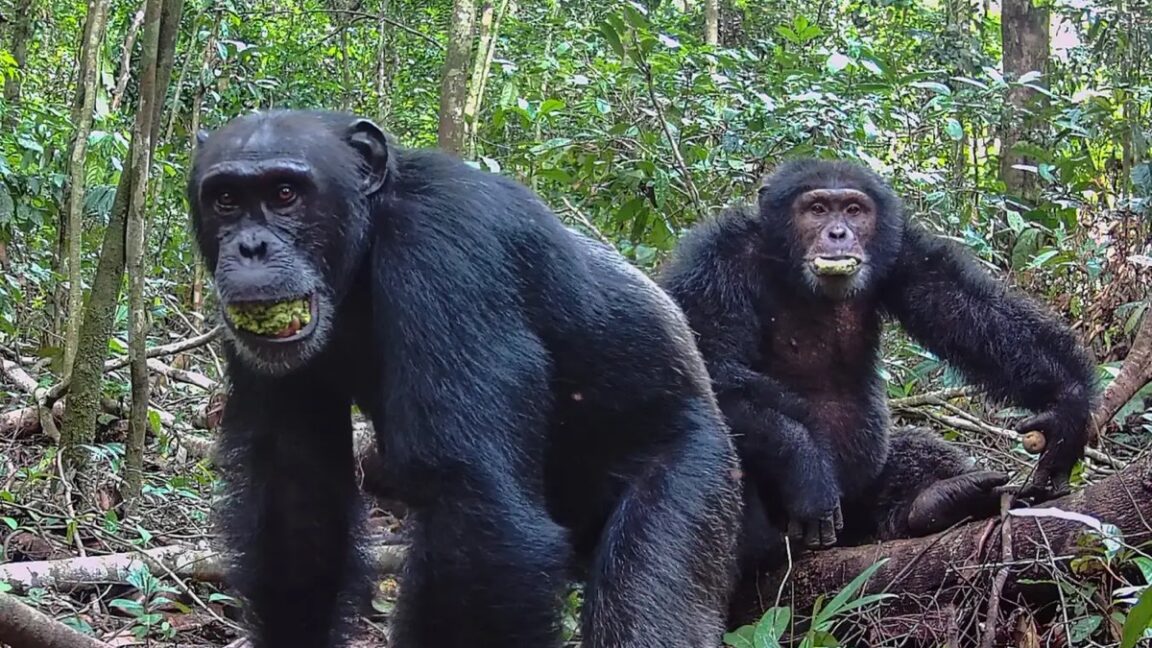Science
Chimpanzees Consume Alcohol Equivalent to Two Drinks Daily

Chimpanzees in the wild are consuming alcohol at a rate equivalent to nearly two drinks per day, according to a new study published in the journal Science Advances. The research, led by biologist Robert Dudley from the University of California, Berkeley, provides the first quantitative evidence of ethanol consumption in wild chimpanzees, challenging previous assumptions about primate diets and their relationship with fermented fruits.
The study examined chimpanzee populations at two sites: the Ngogo Chimpanzee Project in Uganda and another location in the Ivory Coast. Researchers found that these chimpanzees consume approximately 14 grams of alcohol daily, equivalent to a standard drink in the United States. After adjusting for their smaller body mass, the team concluded that the chimps are effectively ingesting the equivalent of two alcoholic drinks each day.
Documenting Alcohol Consumption in Chimpanzees
Dudley and his colleagues monitored the consumption of fermented fruits, particularly African breadfruit, which has been shown to contain measurable levels of alcohol. Earlier this year, they observed wild chimpanzees sharing this fruit, marking the first documented instance of nonhuman great apes actively sharing alcoholic foods. Between April and July 2022, the researchers recorded ten instances of selective fruit sharing among 17 chimpanzees, who exhibited a strong preference for the riper fruit.
Using a portable breathalyzer, the team measured the alcohol content of fallen fruit samples. They discovered that about 90 percent of the sampled fruit contained some ethanol, with the ripest varieties reaching an alcohol by volume (ABV) of 0.61 percent. While this concentration is lower than typical alcoholic beverages consumed by humans, the sheer volume of fruit consumed—estimated at 40 kilograms per day—means the cumulative ethanol intake could be significant.
Insights into Evolutionary Behavior
The findings support Dudley’s controversial “drunken monkey hypothesis,” which suggests that the attraction to alcohol may be rooted in our evolutionary past, dating back around 30 million years. Co-author Aleksey Maro, a graduate student at UC Berkeley, stated that this study implies our ancestors were similarly exposed to dietary alcohol, potentially fostering a link between alcohol consumption and the rewards of finding sugary fruits.
While the chimps’ consumption of alcohol is accidental, it raises interesting questions about the social behaviors of these animals. As primatologist Catherine Hobaiter of the University of St. Andrews noted, the study indicates that this relationship with alcohol may foster social bonding among chimpanzees as they gather to consume fermented fruits.
Future research aims to refine these findings by analyzing the chimps’ urine for alcohol metabolites, a step previously taken in a 2022 study on spider monkeys. This analysis could provide more precise estimates of the ethanol-laden fruit consumed by the chimpanzees.
In summary, the study sheds light on the complex dietary habits of chimpanzees and their potential historical connection to human alcohol consumption, suggesting that our relationship with alcohol is deeply embedded in our evolutionary history.
-

 Politics4 weeks ago
Politics4 weeks agoSecwepemc First Nation Seeks Aboriginal Title Over Kamloops Area
-

 World5 months ago
World5 months agoScientists Unearth Ancient Antarctic Ice to Unlock Climate Secrets
-

 Entertainment5 months ago
Entertainment5 months agoTrump and McCormick to Announce $70 Billion Energy Investments
-

 Science5 months ago
Science5 months agoFour Astronauts Return to Earth After International Space Station Mission
-

 Lifestyle5 months ago
Lifestyle5 months agoTransLink Launches Food Truck Program to Boost Revenue in Vancouver
-

 Technology3 months ago
Technology3 months agoApple Notes Enhances Functionality with Markdown Support in macOS 26
-

 Lifestyle3 months ago
Lifestyle3 months agoManitoba’s Burger Champion Shines Again Amid Dining Innovations
-

 Top Stories2 months ago
Top Stories2 months agoUrgent Update: Fatal Crash on Highway 99 Claims Life of Pitt Meadows Man
-

 Politics4 months ago
Politics4 months agoUkrainian Tennis Star Elina Svitolina Faces Death Threats Online
-

 Sports5 months ago
Sports5 months agoSearch Underway for Missing Hunter Amid Hokkaido Bear Emergency
-

 Politics5 months ago
Politics5 months agoCarney Engages First Nations Leaders at Development Law Summit
-

 Technology5 months ago
Technology5 months agoFrosthaven Launches Early Access on July 31, 2025





















